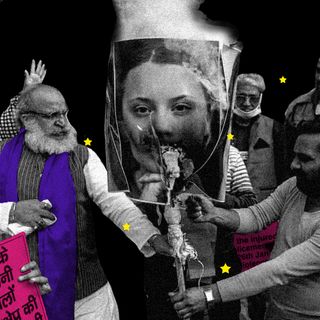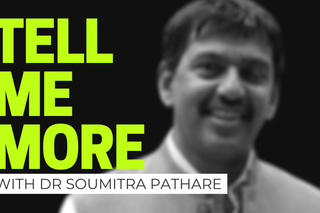
Tell Me More: Talking Mental Health Policy and Media Reportage With Dr. Soumitra Pathare
“Law, in general, is supposed to be a deterrent, which is hilarious, because when has the law deterred anybody?”

In The Swaddle’s interview series Tell Me More, we discuss crucial cultural topics with people whose work pushes societal boundaries.
Dr. Soumitra Pathare (MD MRCPsych Ph.D.) is a Consultant Psychiatrist and Director of the Centre for Mental Health Law and Policy at the Indian Law Society. His primary interests are in the areas of mental health policy, scaling up mental health services, rights-based care, and legislation. The Swaddle’s Aditi Murti spoke to Dr. Pathare about the Mental Healthcare Act, 2017, and problems with Indian media’s mental health reporting.
The Swaddle : You’ve written about the Supreme Court’s insensitive usage of the term “unsound mind.” Could you take us through the history of the term?
Dr. Pathare: When you think ‘unsound mind,’ you wonder why the term is only in the contracts act and nowhere else, right? In the 19th century, one of the things that people (especially merchants) and markets were concerned about, was the enforceability of a contract. They want to ensure that if a contract is signed, then it is enforceable. And one of the ways a contract isn’t enforceable is if a person says that they weren’t in their right mind while signing it, and therefore couldn’t understand it. That’s why the Contract’s Act includes the notion of an ‘unsound mind.’
Now if you look at the definition of ‘unsound mind’ in the Act, it doesn’t only include mental illness. If you’re, say, intoxicated or have a delirious fever, you’re of ‘unsound mind’ — because in that state, you cannot understand what’s going on. On the other hand, if you have a mental illness, but can understand what’s going on around you, then you’re of ‘sound mind.’ So, with respect to the Act, this is a sophisticated concept that only requires soundness of mind while signing the contract.
However, when this particular term entered common parlance and started being used more commonly in the judiciary, the term became included in more and more legislations. This became a copy-paste thing. People took a piece of legislation from somewhere, put it elsewhere, and didn’t know how to interpret it. I think what happened was that the word ‘mind’ led people to equate an ‘unsound mind’ with mind-related issues. So the judiciary then started interpreting it as ‘unsound mind’ equals mental illness. Which doesn’t make sense because the term in vogue for mental illnesses back in the 1800s was ‘lunatic.’ So if the people who drew up contract laws in the 1800s wanted to refer to people with mental illnesses, they’d just use this term.
TS: So considering the complexity of mental health conditions and how easy it is to misuse terms like ‘unsound mind,’ should we define mental health legally at all? Because if you are declared unsound of mind, you could have several rights taken away from you…
SP: The thing is, not having a definition of ‘soundness’ is what got us these absurd interpretations. The lack of a definition means that anyone will interpret anything anyway they like. A lot of times, people like to equate ‘mad’ with ‘bad.’ Like, in common parlance, a lot of people like to call Donald Trump ‘mad’ — but he clearly has no mental illness. That way, I worry that without definitions, anything that doesn’t fit into our social norms will be declared as a mental illness.
TS: But I’m also curious about how you’d legally define something subjective like mental illness?
SP: There’s International Classification of Diseases, and it has a certain criteria for each possible disease. For example — if you say diabetes, there’s a fixed criteria associated with diagnosing a person as diabetic officially. Similarly, someone with schizophrenia will need to meet a set criteria for that disease. This way, the definition is tied to something objective.
But, objective measures can still have subjective definitions — which is the case with mental health, and a host of other diseases. For example, having a migraine or dysmenorrhea is a subjective condition because there’s no quick and easy indicator for the same beyond a person saying they’re in pain. There’s no particular lab test for dysmenorrhea either — but no one would completely disregard it purely on the basis of that right? It can still be treated, so it’s a diagnosis.
Related on The Swaddle:
It’s Time for a More Humane Approach to Mental Health Care
TS: An interesting thing about the 2017 Mental Healthcare Act is that it decriminalizes suicide, and that made me wonder what was the point of legally criminalizing it in the first place?
SP: So this is a slight misconception — it doesn’t exactly decriminalize suicide. I prefer saying it all but decriminalizes suicide. In order to truly decriminalize it, you’d have to strike Section 309 (Attempt to commit suicide) off the Indian Penal Code. What the Mental Healthcare Act did was create a small pocket within Section 309, saying that if anyone attempts suicide, the state will presume that it’s because of severe mental stress. But you’ve still kept 309, which means now it is the police’s responsibility to disprove the presumption that you were under severe mental stress. So say for example, if someone attempts suicide by self-immolation or hunger strike during a political protest, then the police can prove that the attempt to die by suicide was not due to mental stress.
Coming to why suicide was criminalized. Indian law was, in a way, copy-pasted from British law, which was heavily influenced by the Church in the 14th-16th century. The British had this religious notion that your life doesn’t belong to you; it belongs to God. This is why it was illegal to die by suicide — to make sure nobody went to hell. And then, nobody bothered to amend the Indian Penal Code since. First, this doesn’t fit into Indian culture, because suicide is a bit more accepted or viewed differently in certain religions native to India — so why have it?
There’s also this more practical idea that if you criminalize suicide, people will attempt it less. Law, in general, is supposed to be a deterrent, which is hilarious, because when has the law deterred anybody? What’s interesting is, this law acts as a deterrent against healthcare rather than suicide. For example, if you attempt suicide and go to the hospital, the doctors will have to record a medical case and call the cops. Without full decriminalization, people who attempt suicide cannot seek medical help safely. Imagine the lives doctors could save if people who attempt suicide can willingly seek help.
TS: Apart from ‘all-but-decriminalizing’ suicide, the 2017 Act also says the State is responsible for the rehabilitation of those who attempt suicide. What does that entail?
SP: Anything that the State can manage, actually. While drafting the law, we left it a bit open-ended, so it just says rehabilitation rather than health rehabilitation. This is because suicides are caused by several complex factors, not one mental illness symptom — which means the State can do more to alleviate that particular distress.
We could definitely do more as a nation, I think. The most important things we could start with are avoiding the conflation of mental health and suicide, and then by sincerely believing that suicide is preventable. I actually don’t think anyone in Indian policy actually believes this enough. If you talk to them, they know they have to be seen doing something, but they don’t think it’s really possible to actually prevent suicide.
TS: Another thing that the 2017 Act tackles is admitting someone into a hospital without their consent. There’s so much anecdotal and research-based evidence that documents the trauma of being admitted without your consent. What are the ethical deliberations that go into deciding on something that can lead to involuntary institutionalization?
SP: I worry about a term like involuntary institutionalization, because being admitted to a hospital without consent isn’t always equal to something as serious as institutionalization. It does happen and it does lead to people spending decades (30-50 years) in mental hospitals, but that’s at a very extreme end of the discussion, in which it’s quite hard to draw the line — at what point does your stay at a mental hospital become institutionalization? Nuance is important here.
With respect to the current laws, there’s something called an advanced directive, in which you nominate someone to make decisions for you when you’re not capable of making your own. For example, if a person is incapable of deciding, he can say that my wife is now responsible for admitting me to a hospital. He’s consenting to go to the hospital for a period of maximum 30 days, after which he can leave, unless his nominated individual and a doctor decide together that he’s not well enough. And if he disagrees, there’s a judicial district board he can appeal to in order to contest the decision. Institutionalization, on the other hand, means you’re in an institution (like a mental hospital) long enough that the institution dictates everything you do, and then becomes your life. The only way one could end up in a hospital for a longer time is if the board, the doctor and the nominated individual decide that that you are at risk of harm to someone or yourself, or that you will negate your health and wellbeing, or that there is no way to treat you at home.
TS: And the district board can also change your nominal representative right? In what context can that happen?
SP: If the board felt that the nominated representative was not acting in the person’s best interest. Or, the nominated representative was neglecting their duties or the nominated representative was just not available. For example, then the board can say, well, you’re just not doing the job you’re supposed to be doing, or you’re doing the job so badly that you’re now putting somebody at risk. In that case, the board can appoint somebody else. It’s the same way that courts can change a guardian.
Related on The Swaddle:
We Need to Reframe Mental Health as a Social Justice Issue, Not a Personal Problem
TS: So, media coverage of mental illness has been awful for a long, long time. What’s getting in the way of the media industry that prevents it from reporting responsibly on mental health?
SP: There’s guidelines for suicide and mental health overall that can help the media report responsibly — even the Press Council of India has issued some for mental health. Research says that there would be 2% less suicides if the media reported suicide responsibly — globally, that’s a massive number of preventable deaths. If 800,000 people die of suicide each year, responsible reporting saves 16,000 lives.
Unfortunately, there’s no way to understand why the media refuses to follow these guidelines apart from that they do not serve the community anymore. The media is a self-fulfilling structure and institution that runs on sensationalism. Naturally, they’ve lost all credibility with respect to mental health reporting. You can try tracking the media, giving awards and training reporters to fill gaps like lack of knowledge, but overall so many average individuals believe that the media simply isn’t working in public interest anymore.
TS: The Mental Healthcare Act is a young, progressive law, and it’s too soon to tell if it is showing results. But, India has always been a nation that fails at the implementation stage. Do you have a less cynical, more hopeful view on the same?
SP: It’s been a challenge to get a great legislation in, but I don’t have massive hopes up about things being implemented by themselves. Unfortunately, the only way to really make this happen is if stakeholders keep pushing the state and keeping it accountable. This means making bureaucrats work, doing legal advocacy, working with communities.
But, I’m still optimistic. If you look at the older mental health act — the one passed in 1983 — even at the time of its repeal around 30 years later, it had not even been fully implemented. if you compare that to the current tag, which is only three years old, then you see there’s a lot of activity happening and people are going to court people and advocating talking about it. The main issue is, the mental health community needs to work to implement it. I’m not saying it should be like this, but I know it’s the reality.
Aditi Murti is a culture writer at The Swaddle. Previously, she worked as a freelance journalist focused on gender and cities. Find her on social media @aditimurti.
Related


Rihanna Draws Attention to Farmers’ Protests, Gets Flooded With Memes Glorifying Her 2009 Abuse
